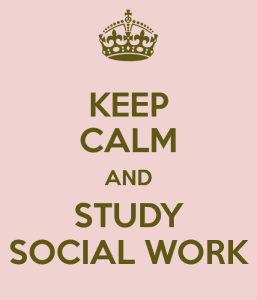This year’s internship is my sixth one thus far, and will most likely be my final internship. Considering that, I have come think a bit about what I think are key takeaways from my internship experiences.
1. The most important relationship I came to have in any given internship was the kind of relationship I had with my supervisor.
This semester I feel incredibly motivated and ambitious and inspired in my internship. Part of this is because for the first time ever I have my own assigned desk and computer and secured filing cabinets, and my own personal network ID, but again, it always comes back to the relationship I have with my supervisor. If I feel trusted, if I feel like I can give honest feedback and be respected, if I feel supported at times when I feel overwhelmed, then it’s that much easier to be successful in my internship. Some of my supervisors were sometimes micro-managers, condescending, expecting more and more, instead of knowing when to be supportive. To some supervisors I did a poor job of communicating my needs and my strengths/weaknesses. Either way, whether I was at fault or my supervisor didn’t respond most appropriately, if the relationship between my supervisor and myself were somehow compromised, the internship overall felt like a drag and my performance was negatively affected. Everything else could be going greatly (though not likely if this relationship is problematic) but if just this one aspect was an issue, I would inevitably dread going to my internship.
2. Interacting with other staff members has been more challenging and draining than interacting with clients, especially staff members of other disciplines.
This is a very personalized takeaway, meaning this might be true for me, but not necessarily so for other social work interns. I generally have a great passion for and joy in interacting with clients. These interactions for the most part can be planned for, scheduled for, and prepared for. Even in the many instances when a client abruptly enters the room looking for me or calls my office, even when I feel most challenged by working with clients, clients are the #1 reason I decided to pursue social work and so I’m typically able to welcome them and learn from my engagements with them.
However the reality of this work is that I’ll spend more time with other staff members than with clients. I’m not particularly good at small talk and many of my interests and hobbies do not align with those of my colleagues and coworkers. So that can be awkward. Bringing up issues could cause some unwanted tension. We all work like staff hierarchy doesn’t matter too much, but the reality at the end of the day is that it does, and finding the right balance between working together while respecting the official title and authority of a fellow staff member can be really tricky sometimes.
Then there are the non-social work staff to interact with. When I was an intern at a case management agency, I had to meet doctors, nurses, psychologists, HASA (HIV/AIDS Services Administration) case workers, and interior designers. Being an intern at a high school meant I had to collaborate with the principal, the assistant principal, the office administrator, teachers and even cafeteria workers. At my current internship I sometimes find myself in a meeting with lawyers, politicians, sociologists, accountants, and database technicians. These are undoubtedly great opportunities and I strongly believe that collaborating well with other professionals is the mark of a great social worker. However, my personal opinion is that social workers and non-social workers think very, very differently. If these differences in ways of thinking and approaching issues is not addressed or if too much time is spent on ironing out these differences, well then… (1) ugh, the work is dreadful and annoying, and (2) the qualify of services we provide to our clients is negatively affected.
3. Too many of us too often overlook socioeconomic factors.
Read the full story HERE.
